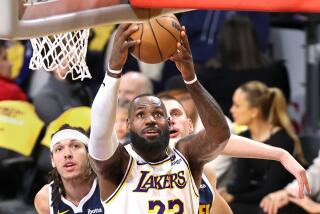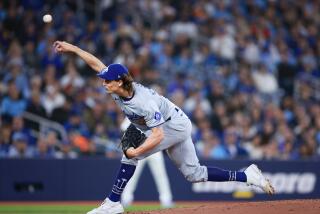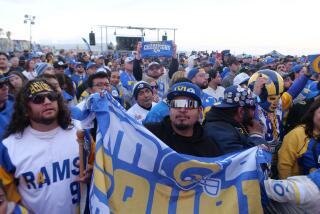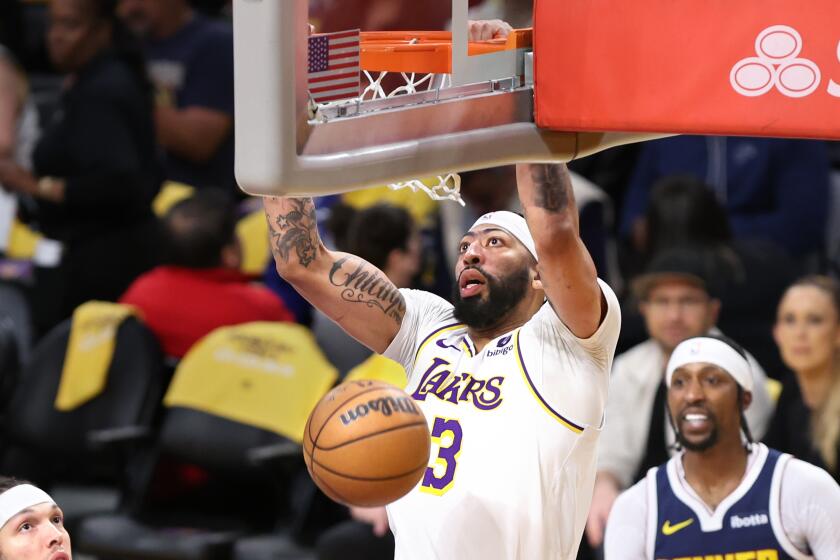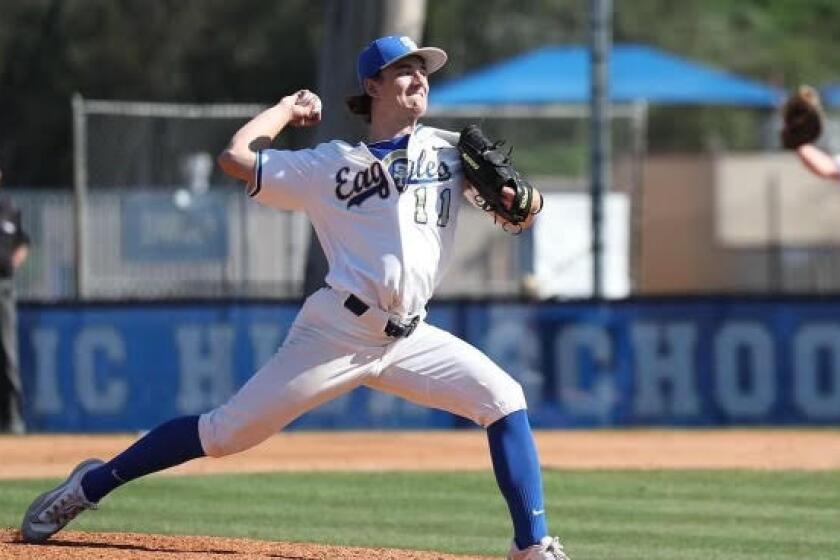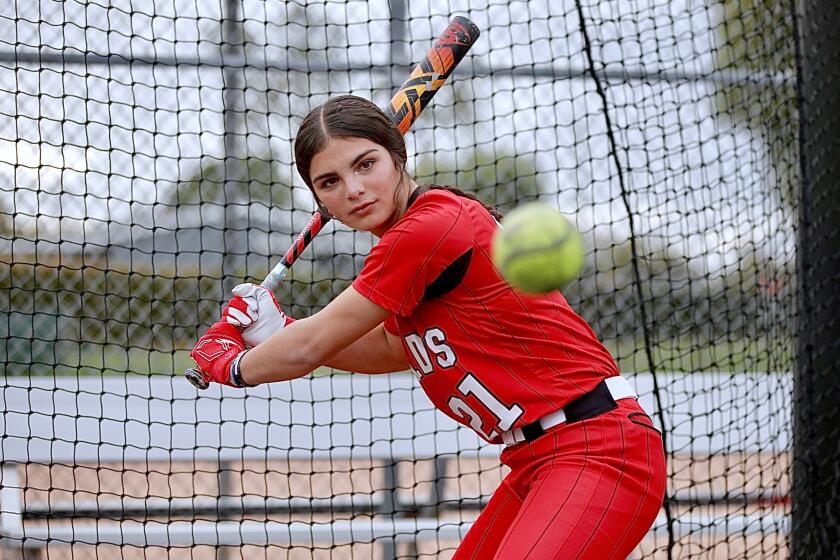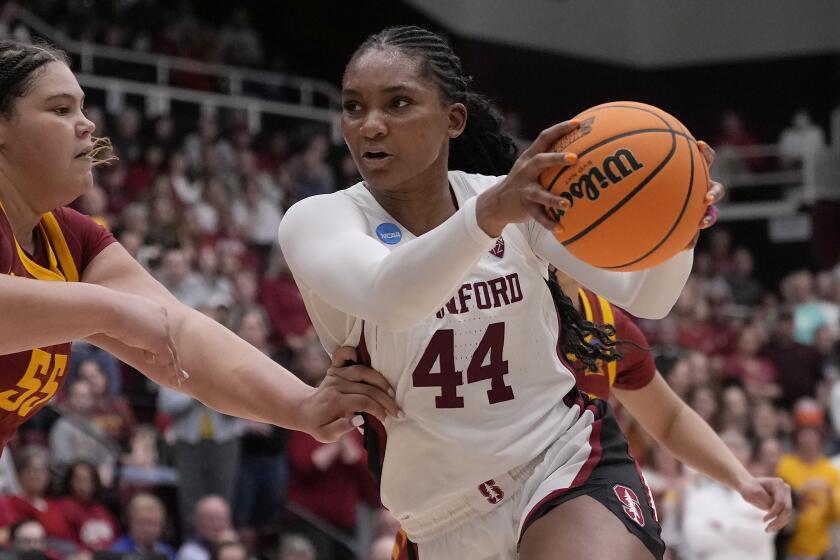Rebuilding the Buzz
In a rare intersection of sports and real life, the Lakers, for whom tonight represents one game in the NBA standings, will meet the New Orleans Hornets, for whom it’s also a glimpse of what their future might hold.
Everyone else here, from the people attending to those who don’t know New Orleans has an NBA team or don’t care, has more at stake in what is a landmark in rebuilding their devastated home.
For the record:
12:00 a.m. March 11, 2006 For The Record
Los Angeles Times Saturday March 11, 2006 Home Edition Main News Part A Page 2 National Desk 0 inches; 27 words Type of Material: Correction
Pro basketball -- An article in Sports on Wednesday said the NBA’s Jazz franchise moved from New Orleans to Utah in 1975. The correct year is 1979.
“There are things that have emotional or symbolic importance, that have the effect of lifting your spirit,” said Stephen Perry, head of the city’s Metropolitan Convention and Visitors Bureau.
“This is one of those. ... It’s certain key restaurants opening, things like the arena opening this week, some of the museums.”
It will be the city’s first professional sports event since Hurricane Katrina made landfall Aug. 29, and one of three games the Hornets will play here this month.
Now based in Oklahoma City, the team is scheduled to play six games here next season. NBA officials have announced their intention of returning the team full-time for the 2007-08 season.
The NFL’s Saints, who were based most of last season in San Antonio, will return full-time next fall. Nevertheless, there is skepticism that the Saints will stay and that the Hornets, a surprise hit, will be back to stay.
Saint owner Tom Benson talked about moving before Katrina and was about to begin negotiations to make his move to Texas permanent, before NFL Commissioner Paul Tagliabue intervened.
Hornet owner George Shinn was circumspect enough -- at first -- to be called “the un-Benson” by a local columnist. Nevertheless, neither Shinn nor Commissioner David Stern has made an unqualified commitment to return permanently.
At the recent NBA All-Star game, Stern was asked about it, in what became a lively exchange.
Q: You’re making an unqualified commitment to go back?
Stern: We are planning to go back. Let me ask you a question: Do you think we’ll go to the Olympics if bird flu is pandemic? ... There may be a thousand different reasons why the world tomorrow will not be the same as it is today. All you can do is set things in motion and plan to follow through on them. And we’re planning to go back to New Orleans. I don’t know if that’s not good enough for you, but I’m trying.
Q: An unqualified commitment would be, we are going back.
Stern: We plan on going through with the commitment to return to New Orleans and, in fact, there’s a lease that requires it. You want a certificate? Is there a notary in the house? Whatever you’d like.
Of course, not everyone is as practiced a diplomat. Laker Coach Phil Jackson recently expressed his doubts, noting, “I have an unbiased and non-prejudicial view of New Orleans. I’ve always had a wonderful time in the city. However, it is tough for them to support NBA basketball.
“There are not a lot of corporate businesses and it has become a corporate business situation that has made the NBA successful. I never thought after the Jazz left [in 1975] they’ll be able to support an NBA franchise again.”
His remarks were just re-published in the Times-Picayune. One way or another, it’ll be a hot time in the old town tonight.
To Be (Here)
or Not to Be
Teams have long demanded that local governing bodies build stadiums and arenas, and enough of them, such as the Cleveland Browns and Oakland Raiders, have deserted legions of faithful fans to show they weren’t bluffing.
The “major league” aura teams cast was deemed so valuable, they weren’t expected to do anything in return except play their games, but Katrina has changed the equation here.
New Orleans’ devastation was met by a resolve to rebuild by its most famous residents. Ten days after Katrina, Paul Prudhomme returned, had the equipment from K-Paul’s, his restaurant in the French Quarter, taken to his seasoning factory and began cooking for first responders, police and National Guardsmen.
Prudhomme, now on a committee to promote the recovery with other celebrities, says it never occurred to him to do anything but reopen his restaurant.
“If New Orleans was destroyed and I had to leave, I’d do it,” Prudhomme said, “but I wouldn’t open another business. I wouldn’t want to do this anywhere else.”
However, if New Orleans is a world capital for chefs and musicians, it’s an outpost in the NFL and NBA, representing one of the most popular destinations but one of the smallest.
That was before Katrina and terms such as “repopulation,” when workers were in such demand that Wal-Marts closed at 9 p.m. and Burger King offered $6,000 bonuses.
The Hornets were, as Shinn put it, “the new kids on the block,” having been here three seasons, but the Saints were as much a part of life as Mardi Gras. In 38 seasons, while winning two division titles, with some teams so bad that fans wore bags over their heads, the team was No. 10 in the NFL in attendance, playing out of its fifth-smallest market.
Nevertheless, with a thin corporate base to buy sponsorships and suites, Benson, a New Orleans native with car dealerships in San Antonio, had long been looking around.
Several months before Katrina, his lawyer, Stanley Rosenberg, said Benson was “interested in relocating the franchise, possibly to San Antonio or Albuquerque.”
Holding Benson in place was an ongoing struggle. He had a lease through 2010, but it wasn’t the old-fashioned kind stipulating how much rent he paid.
Benson not only paid no rent, he got annual subsidies -- $40 million over the next two seasons -- with the state of Louisiana taking a percentage of revenues.
In San Antonio, home of the vast Alamodome, a white elephant built for the NFL and abandoned by the NBA’s Spurs, events seemed to move swiftly toward the long-speculated-upon move.
In an Oct. 26 newspaper ad, Benson said he had to look at all options, announcing, “No decision has been made about the future of the team because no decision has been made about the future of New Orleans.”
Meanwhile, San Antonio Mayor Phil Hardberger, leading a drive backed by another local car magnate, former Spur and Minnesota Viking owner Red McCombs, announced the Saints would start “discussions” with city officials.
However, after three trips to New Orleans by Tagliabue, and having been assured of league subsidies, the Saint owner turned homeward.
On Dec. 30, Benson announced, “The Saints look forward to serving as a leader in the rebuilding and revitalization of our great community,” adding, “It’s the right thing to do for us to go back and play as many games as we can in the city.”
It had taken four months and a day to commit to “the right thing.” The team will return in the fall to much rejoicing -- season ticket renewals are running at four times last season’s pace without benefit of advertising -- and worldwide press coverage.
What happens after that is the question.
“I think it was doubtful the Saints were going to be here long-term before Katrina hit,” says Gary Roberts, a Tulane professor who runs a sports law program and once worked with Tagliabue at a Washington law firm.
“When you take a marginal market and hit it on the head with a sledgehammer, you create an even more difficult environment. ...
“There’s no question that Tagliabue put his foot down and said the Saints are going to be in New Orleans short term. He may have been genuine in his concern and sympathetic for New Orleans’ situation, but it was primarily a business decision.
“It’s good P.R. for the league to be seen as not leaving New Orleans at this point, but that’s not going to be the calculation in a few years.”
Home Is Where
the Heart Is Tonight
It’s a lovely spring with clear skies and 70-degree days. The tourist destinations are in good shape and the hotels are busy, although mostly with government workers.
Mardi Gras, just concluded, was memorable, even without the usual crowds as Louis Armstrong Airport approaches 50% of its pre-Katrina flights. Floats lampooned everyone, as usual, but there was so much to work with, be it the slow federal response (“Chirac, Take Us Back,”) or local government in the person of Mayor Ray Nagin (“Drink ‘Til Nagin Makes Sense.”)
The carnival spirit remains on T-shirts in the French Quarter gift shops (“Make Levees, Not War” ... “Support Our Troops, N.O.P.D.” ... “N.O.P.D. Not Our Problem Dude.”)
The Hornets’ return is only part of the local upswing. New Orleans Arena, their old home across from the Superdome, sparkled in last week’s reopening with Placido Domingo. Evangelist Billy Graham comes in this weekend.
Laker and Hornet players will fan out, working with Habitat for Humanity, et al. Stern has no less interest in appearances than Tagliabue, but as in the NFL, where Atlanta’s Warrick Dunn challenged players to each put up $5,000, many NBA players contributed without prodding.
Stern is also working on bringing his 2008 All-Star game, a keen stroke, at once making a routine ritual into a marquee event and putting New Orleans, which hosted nine Super Bowls and four Final Fours but had nothing coming up, back in the big-event business. Now a local businessman says talks are underway for a 10th Super Bowl and a fifth Final Four.
Even so, Benson’s concerns about the area, which lavished its adoration on his team, are nothing compared to Shinn’s.
Shinn has a sweetheart lease too; he’s paying no rent and getting $1 million annually. However, for three seasons here, his Hornets burrowed ever lower, capped by last season’s 18-64 debacle when they were No. 30 in attendance.
Now they’re a Cinderella story in Oklahoma City, No. 7 in the West and No. 11 in attendance. Reminded by Stern of the sensitivity of his position, Shinn managed to keep to the high road, marveling at his good fortune but insisting he would return to New Orleans.
However, at All-Star weekend, while Stern was insisting on the league’s commitment, Shinn reportedly told guests at a cocktail party he wanted to stay in Oklahoma City. It seems that his guests, sponsors from Oklahoma City, also included two New Orleans season-ticket holders who had won the trip in an auction last season.
One, Hal Braden, told the Times-Picayune that Shinn said, “I have my accountants looking into it and we’re trying to figure out the best place to be business-wise, but you can only guess where I want to be. ... In 10 years I hope to see an All-Star game in Oklahoma City and I’d like for the Hornets to be the host.”
Shinn, asked by the paper for his side, said, “I’m not going to get into a he-said-she-said debate.”
Anyway, they’re home, or at least one of them.
More to Read
Get our high school sports newsletter
Prep Rally is devoted to the SoCal high school sports experience, bringing you scores, stories and a behind-the-scenes look at what makes prep sports so popular.
You may occasionally receive promotional content from the Los Angeles Times.
